In the series premiere of Coolest Lesbian Alive, Lena Waithe’s new Showtime drama The Chi, we meet a sprawling group of characters. (Okay, Common and a bunch of other people are involved in this project too, but we all know the real reason we’re here.) They are parents, children, somewhere in between; they are youthful in age and outlook; they are worn, jaded; they are optimistic, in love; they are troubled, driven, angry, tender; they are chasing dreams or motorcycles on their bikes. They are alive. They are dead.
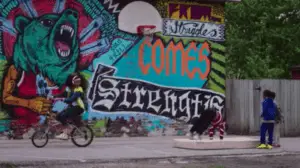
The opening shots follow Coogie, a young boy of maybe 14, dressed all in pastels, spinning through his city on his bicycle. As the orange glow of sunset falls over the Chi, he pedals past the corner store, shoots some hoops at the basketball court, and, as I already mentioned, attempts to race a guy on a motorcycle down a street. His childlike sense of adventure and fun comes across without him needing to say a thing.
It gets dark, and Coogie heads to the back fence of a house where he’s been feeding a dog every night. He hears commotion, maybe a party, from inside the house, and wonders aloud what goes on in there. When he hears a car speeding off around the corner, he pedals over to find the dead body of another young man, a gunshot victim. No one is around. Coogie looks scared and horrified, but also not surprised. He leans down to check if the dead kid has anything he would want- he settles on the chain from around his neck, and his sneakers. A lookout across the street whistles to him as a warning, and Coogie runs away as police cars roll up. He’s caught by the cops and put in a squad car. Thus begins the saga: an afternoon of play and life; a night of fear and death; a decision to take a gold chain that sets into motion the cascade of events that will continue to play out over the course of this series.
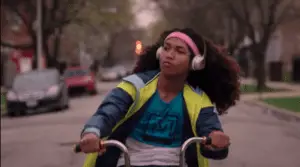
We meet a lot of characters over the next hour, so I’m going to lay them out as best as I can. Detective Cruz is the “good cop.” He interrogates Coogie and realizes he has nothing to do with the death of the boy, whose name was Jason. Detective Cruz seems to have, or at least want, a good rapport with many people in the neighborhood, and also seems to want to see the best in people. Coogie’s mother, Laverne, is an alcoholic who clearly loves her children, but she is angry. She’s angry at Coogie for putting himself in a situation involving the police, and she also seems angry about her other son, Brandon, Coogie’s older brother, moving into another social and economic class. Brandon is a successful cook at an upscale restaurant, and because of his dedication and drive, he gets promoted to line cook. He lives with his girlfriend, Jerrika, in an airy apartment and has a passion for cooking that fuels his dream of opening his own restaurant someday.
When Laverne and Brandon pick Coogie up from the police station, Brandon suggests that Coogie stay with him and Jerrika for a few days, for a change of pace and to “get out of the neighborhood.” Laverne is offended by this and storms off, but Coogie seems more than happy to go stay with his brother.
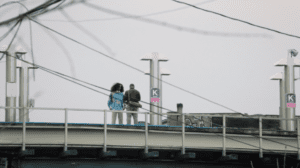
Meanwhile, we meet Tracy, Jason’s mother, and Ronnie, her sometimes-boyfriend/lover/on-and-off father figure to Jason. Both are despondent over their loss. We see the funeral, populated by Jason’s all-state-winning team and a slew of other people trying to console Tracy. Later, she and Ronnie sit on her couch, and Ronnie promises her that he will be the father and find out who killed Jason.
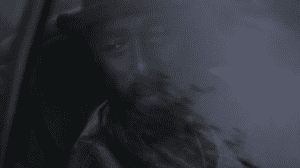
We also meet Kevin, a boy of maybe eleven, walking to school with his older sister Keisha. Kevin has two best friends, Jake and Papa, and together they fit the trope of Boy Squad Who are Cute and Innocent and a Little Annoying. Kevin has a crush on a girl named Andrea, who convinces him to sign up for the school play. Yet by the next day, she’s dating Jake, and Kevin is pissed. He doesn’t want to do the play anymore, but the director nudges him to audition, and Kevin bravely stands on a stage and sings his song. The director encourages him, saying his voice is pretty good, and it’s a really sweet scene showing the power of teachers who invest even just a little extra energy into emboldening their students to leave their comfort zones.
Keisha, meanwhile, isn’t in school—she’s at Emmett’s house, giving him a blow job. Emmett is the worst bro-dude ever. He lives with his mom, Jada, who is a superior human, but for some reason he’s the most self-obsessed character I’ve seen since every adult child on Transparent. Keisha demands that Emmett give her hers, and stops before he finishes, moving to the bed. He whines like a baby, then shoves her under the bed when he hears his mom come in. Jada chastises him for doing literally nothing productive with his life and then invites whoever is under the bed to stay for breakfast.
Later, Emmett is doing the only other thing he cares about besides sex: buying sneakers. As he’s trying them on at the store, a young woman comes in pushing Emmett Jr. in a stroller and yelling at Emmett for not taking care of his responsibilities. Emmett says some truly horrible things to her about how much of a slut she is and how the baby isn’t his, and the store owner kicks the woman out, because Patriarchy. The next day, she drops the baby off at Jada’s house with a paternity test proving he is the father, and Jada does not bend to Emmett’s whining about how he needs to go to work to get his sneaker money and leaves him with his son so she can go to her own job.
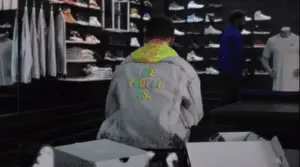
As the episode nears its end, it takes a dramatic turn. Ronnie is on the hunt for Jason’s killer, and finds out from one of the lookouts on the block where he died that a kid with a big afro had been there that night. When Ronnie sees Coogie at the corner store where Coogie gets the jerky he feeds to the dog he likes, he starts to interrogate him. Coogie is scared, and says he had nothing to do with what happened to Jason, but Ronnie sees that he’s wearing Jason’s chain. As Coogie tells Ronnie just to take the chain, Ronnie is blinded by grief and rage, and, ostensibly by accident, pulls the trigger of the gun he was using to scare Coogie into talking to him. Coogie falls into the grass and dies. Ronnie looks around and sees no one, except for one extremely scared little human behind a car: Kevin. He and his crew were walking home from school when they heard the argument escalate, and Kevin had gone closer to look. He was the only one who saw Ronnie, and Ronnie saw him, but they both ran away.
At Coogie’s funeral, the second funeral of a young Black boy in one episode, Laverne blames Brandon for not keeping an eye on Coogie. Brandon is crushed by his own guilt, the guilt his mother lays on him, and the grief of losing his little brother. He channels this into working harder at his job, and into doing what Ronnie did: trying to find his brother’s killer. He is led to Kevin, who agrees to show Brandon who it was in exchange for $42, Coogie’s old bike, and his safety. Brandon knows how much he has to lose if he tries to avenge Coogie. But the pull of grief is strong and angry, just as it was for Ronnie.
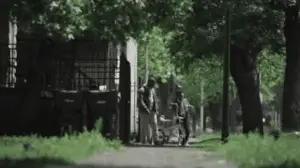
This was a really strong pilot episode. It definitely warranted more than one watch-through, with so much going on at once. I’m looking forward to seeing the ways in which the paths of these character overlap throughout the season, within the lovingly shot overarching character of Chicago. I like seeing this perspective of the city portrayed. While I came to Lena Waithe’s work because of what she’s done with queer writing, the fact that (so far) there isn’t anything queer happening on this show doesn’t bother me.
My only other TV experience with Chicago is Shameless, another Showtime drama with a huge web of characters and complex interwoven plots. But, for everything I love about it, Shameless is a white show. There is only one Black regular character. The Chi is something the world needs more of: a drama with a mosaic of characters that are not white.

